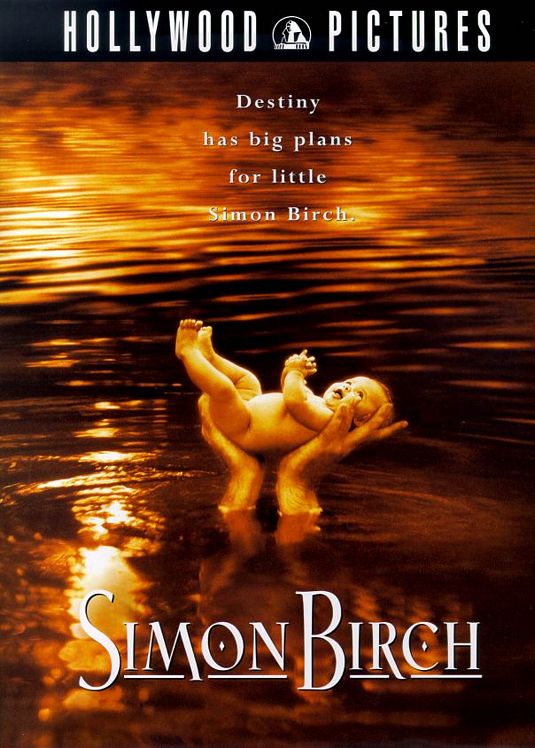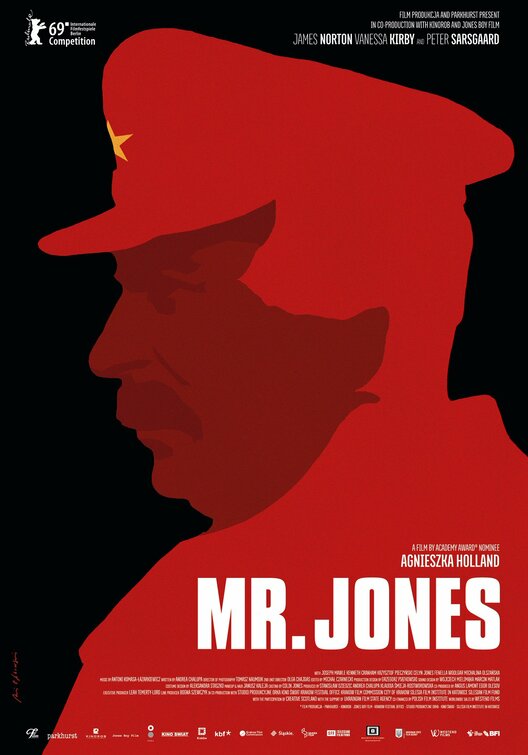“A Courageous Hero Exposes the Evils of Communism”
What You Need To Know:
MR. JONES is a masterful historical drama about Gareth Jones, a British journalist in 1933 who travels to Moscow to interview murderous communist dictator Joseph Stalin. Jones wants to ask Stalin where he’s getting the money to build up the Soviet Union’s military and industrial strength. Jones travels to Ukraine and discovers that Stalin’s tyrannical rule has created a famine there. He exposes the truth back in London, but Walter Duranty, the notorious New York Times writer bribed by Stalin to make Stalin’s regime look good, successfully but falsely discredits Jones. Can Jones reclaim his reputation?
MR. JONES is a very important and terrific historical drama with exceptionable performances and direction. It provides a great testimonial to Truth and exposes the evils of communism, socialism and collectivism, especially Stalin’s brutal communist regime. The movie has many valuable lessons for today’s world of Fake News and violent leftist street thugs. That said, MOVIEGUIDE® advises extreme caution for a salacious party scene in MR. JONES at the Moscow apartment of New York Times writer Walter Duranty, a hedonist and an occultist who sometimes engaged in Satanic rituals.
Content:
Very strong moral worldview supporting Truth, Duty and (implicitly) the natural law of free market capitalism but especially exposing the evils of international socialism, communism and collectivism, focusing specifically on Stalinism and communist dictator Joseph Stalin’s starvation of the people in Ukraine, which killed millions, but also condemning National Socialism in Hitler’s Germany, plus one character at a decadent party is clearly a homosexual man, and the party host tells another man that he can do anything he wants at the party (implying heterosexual or homosexual sex)
One “h” obscenity, no profanities, and man vomits when he realizes he’s been eating something reprehensible
Images of dead people in the snow and in a bed when a freelance journalist visits the Ukraine during Stalin’s, image of a dead teenager boy in the snow who’s upper thigh has been cut away partially to provide food for his starving siblings, man eats some cooked meat with three children, but he vomits when he goes outside and realizes he’s been eating the flesh of their older brother who died, man is chased by soldier, a man is arrested by two government agents, and talk about a journalist being murdered (the communist authorities say the man was killed during a robbery outside his Moscow hotel, but it’s implied they had him murdered because he was investigating a scandal they want to keep hidden from the world)
Partially depicted sex at a party in one scene when a man lunges toward a topless woman and when a homosexual man dancing seductively tries to seduce another man and images of partially naked women dancing at the wild party, and two clothed people at the party are kissing in a corner, plus man tries to kiss woman and hug her as they say goodbye, but she rebuffs him because he’s traveling to a dangerous place where he mostly likely will be killed
Partial full female nudity and full female nudity of a woman dancing alone slowly, and a man going into another room in the background at a wild but languid party, and images of upper female nudity, rear female nudity, rear male nudity, and upper male nudity at the party, intended to show how decadent the man holding the party is
Some alcohol use
Some smoking and woman injects heroin at a party and offers a man some of it but he declines, plus there’s an image of several heroin needles on a table at the party; and,
Government lying and deceit, Russian communist government blackmails a journalist and the British government by holding some British citizens hostage.
More Detail:
The movie is bookended with extreme close ups of pigs eating in a barn next to a farmhouse where author George Orwell is writing his anti-communist masterpiece ANIMAL FARM, an allegory about socialist tyranny, specifically the communist regime in the Soviet Union under Lenin and Stalin. Orwell is writing a letter to someone explaining his allegory. He writes, “The world is being invaded by monsters,” adding, “The future is at stake, sir. Please read carefully between the lines.”
Cut to 1933, where Gareth Jones, the young foreign advisor to former British Prime Minister Christopher Lloyd George, is telling his boss and other men about his recent interview with Adolph Hitler and his propaganda minister, Joseph Goebbels, on a plane ride from Leipzig to Frankfurt, Germany. He warns the men that Hitler and Goebbels have designs on the rest of Europe and will eventually want to expand Germany into Eastern Europe, which borders Russia.
Later in his office, Jones, who can speak several languages, listens to a broadcast from Stalin in the Soviet Union, where Stalin claims that Russia is building tractors, cars, tanks, and chemical plants. He tells his secretary that Britain eventually will probably have to forge an alliance with Stalin to stop Hitler. However, Jones wonders where Stalin is getting the money to build up its industries in the midst of a global economic collapse, the Great Depression. His secretary then gives him the news that his job with Lloyd George is being eliminated because of government spending cuts.
Before he leaves, Jones visits his boss to say goodbye. Lloyd George gives him a letter of recommendation. After thanking the former PM, Jones hands him a final report he wrote about Stalin. Jones tells Lloyd George the government should send him to Moscow to get an interview with Stalin so he can ask the dictator where he’s getting the money to build up Soviet industry.
Mr. Jones decides to travel to Moscow on his own as a journalist to interview Stalin. Before he leaves, he phones a journalist friend in Moscow, Paul Kleb, who tells him that Walter Duranty, the Moscow correspondent for the New York Times, is the man to consult with about how to get an interview with Stalin, Kleb also starts to tell Jones he’s working on a big story, but the phone conversation is cut off by the Soviet authorities listening in on the phone call.
In Moscow, at the foreign press building, Jones meets Duranty and tells him that he was hoping that Duranty could help him get the interview with Stalin. He informs Duranty that one of the things he wants to know is where Stalin is getting the money to build up the country’s industry. Durant informs Jones that his friend, Paul Kleb, was murdered tree days ago in an attempted robbery outside the famous Metropol Hotel. Duranty invites Jones to attend a party he’s holding for the other foreign journalists and other people at his apartment.
The party is a lavish but salacious affair with some semi-nude women and men, opium and even heroin. Disgusted, Jones finally decides to leave and a totally naked Duranty appears, trying to entice Jones with women, or even a man, if that’s his preference. Jones politely declines.
As he’s leaving the apartment building, Jones runs into Ada Brooks, Duranty’s writing assistant at the Times Bureau, who’s delivering some articles to Duranty. He walks her home, and she informs him that Stalin is using Duranty to attract American businessmen to invest in the Soviet Union. She adds that some American businessmen want President Roosevelt to officially recognize the Soviet Union so they can do just that. He also learns that Ada knew Kleb, but she refuses to say if she knew about the big story Kleb was doing.
The next day, Jones visits Ada’s apartment and questions her further about Kleb. She admits Kleb was working on a story about Ukraine, the alleged breadbasket of the Soviet Union, often referred to as “Stalin’s gold.”
By changing Lloyd George’s letter of recommendation from “former foreign advisor” to “valued” foreign advisor, Jones finagles an invitation to visit Stalin’s industrial factories in Ukraine from Foreign Commissar Maxim Litnivov. However, when the train crosses the border of the Ukraine “republic,” Jones escapes his handler and walks into the Ukrainian countryside to see for himself what’s happening. There, he finds death, starvation, empty houses, and children without parents scavenging the countryside. In one sequence, he encounters two children and their older sister. They give him some meat to eat and, to his horror, he discovers the meat is from the corpse of their older brothers, lying in the snow behind the house. At one train station, he sees starving people pleading for bread and Soviet soldiers loading trucks with large bags of grain for Moscow. In another town, he finds more starving people lining up for some meagre handouts. Several men get into fights over bread. He asks one of the women there what happened. He thought Ukraine had such rich farmland that it could feed the entire world “What do you think happened?” she replies sarcastically. “They are killing us. Millions, gone. Men came and thought they could replace the natural laws.”
Eventually, the Soviet police pick up Jones and take him back to Moscow. The Soviet authorities have arrested six British engineers on fake charges of spying. Thinking that Jones still works for Lloyd George, they threaten to kill the engineers if Jones reports what he found out in Ukraine. Before Jones leaves to return to London, Duranty tells him that he helped convince the Soviets to let him go. When Jones ask him how much Stalin is paying him to lie, he tells Jones that there comes a time when a man must choose “a cause greater than himself.”
Back in London, his publisher introduces Jones to George Orwell. Jones mentions his dilemma about the engineers being held by Stalin. If he writes his story, the six engineers might die but millions of lives might be saved. “Speak the truth,” Orwell says. “Regardless of the consequences, it is your duty, and it is our right to hear you. That’s just common sense.”
So, Jones writes his story about the mass starvation in the Ukraine. He even gives a speech about it, saying that the Soviet Union is not the “worker’s paradise” that Stalin, Duranty and others are claiming it is. Of course, Stalin puts Duranty on the case to discredit Mr. Jones, and the New York Times publishes Duranty’s defense of the Soviet Union. Though he admits conditions remain “difficult” during Stalin’s five-year economic plan, he assures his readers there is no famine. Since Duranty and the New York Times won the Pulitzer Prize for Duranty’s 1931 left-leaning reports on Stalin and the Soviets, the international elite and the public don’t believe Jones’ reports.
Disgraced, Jones returns to Wales to write small cultural stories for the country’s main paper. However, when the wealthy newspaper magnate William Randolph Hearst comes to stay at the country mansion he bought in Wales, Jones sees a chance to reclaim his reputation and correct the record.
MR. JONES is a terrific historical drama with exceptionable performances and great direction by Polish Catholic filmmaker and TV director Agnieszka Holland. James Norton turns in a brilliant performance as Gareth Jones, as does Peter Sarsgaard as the corrupt and decadent Walter Duranty, Vanessa Kirby as Duranty’s female assistant, and Joseph Mawle as George Orwell. The wonderful script is written by the descendent of a survivor of the Ukraine famine, Andrea Chalupa.
In addition to its courageous hero, the movie’s emotional core is its strong moral worldview extolling Truth and Duty. In doing so, it exposes the evils of international socialism, communism and collectivism, focusing specifically on Stalinism and communist dictator Joseph Stalin’s starvation of the people in Ukraine, which killed an estimated four to five million people in the early 1930s. It should be noted, however, that the Ukraine death toll is in addition to the five to six million people that the Soviet Union killed in 1921 and 1922 in the Volga Region of Russia under Lenin, the previous communist dictator before Stalin. International socialism, communism and collectivism isn’t the only totalitarian movement condemned by MR. JONES. The movie also condemns the National Socialism of Hitler’s Germany. The movie’s anti-socialist themes are tied into a perfect ribbon by inserting a few snippets from Orwell’s masterful allegory against totalitarianism, ANIMAL FARM. In doing all this, MR. JONES presents an implied defense of the benefits of free market capitalism. By replacing the capitalist economic system of the farms in Ukraine with the forced collectivism of Marxism and communism, Stalin virtually destroyed one of his country’s greatest natural resources, including the Ukrainian farmer. As the Ukrainian woman tells Jones, Stalin’s minions went to the Ukraine and thought they could replace the natural laws. Likewise, some wealthy American businessmen mistakenly thought they could make money by trading with Stalin’s communist regime without hurting anyone.
The renewed, misguided and hysterical interest in socialism among today’s brainwashed young people in the United States and elsewhere, including the streets of Minneapolis, Seattle, Portland, and Los Angeles during recent riots there, makes MR. JONES not only a great historical drama. It also makes the movie a great drama for today. Not only does it expose the inherent evils of communism, socialism, collectivism, and totalitarianism in today’s world; it also exposes the evils of the big media Fake News about history, politics and economics that’s constantly being spewed by media outlets. The same condemnation applies to the corporate globalists who think they can trade with awful communist regimes like Stalin’s or the one now ruling Red China without anyone getting hurt.
MR. JONES is a must-see movie for mature viewers. However, MOVIEGUIDE® advises extreme caution. The wild party scene at Walter Duranty’s Moscow apartment includes lots of explicit nudity. The movie also includes the aforementioned scene of implied cannibalism. The existence of widespread cannibalism during the Ukraine famine is well documented. Reportedly, more than 2,500 people were convicted of cannibalism. Also, it’s been reported that many people who refused to turn to cannibalism died.
Though MR. JONES is truly a great movie, the party scene seems sensationalized for effect. Despite this, it is an historical fact that, in 1913, a young Walter Duranty became the lifelong friend of the infamous Satanist, Aleister Crowley, and participated in orgies, threesomes, drug parties, and satanic rituals with Crowley in Paris. Duranty began working earnestly for the New York Times in Paris during World War I. Duranty’s early work on the Soviet Union was at first anti-communist until he got an opportunity in 1921 to report directly to the Times from the Soviet Union.
Finally, for time and budgetary reasons, MR. JONES only shows Jones talking two times to adults when he visits the Ukraine. In reality, most of his time there was spent walking along the railroad tracks talking to refugees and people in villages and the failed collective farms. So, what you see in the movie is a slightly fictionalized, condensed account of what Jones found. The woman’s dialogue cited above is meant to be a summary of what many people in Ukraine repeatedly told Jones, “There is no bread. We are dying.”
“All animals are equal, but some animals are more equal than others.”
– George Orwell, ANIMAL FARM.


 - Content:
- Content: 






